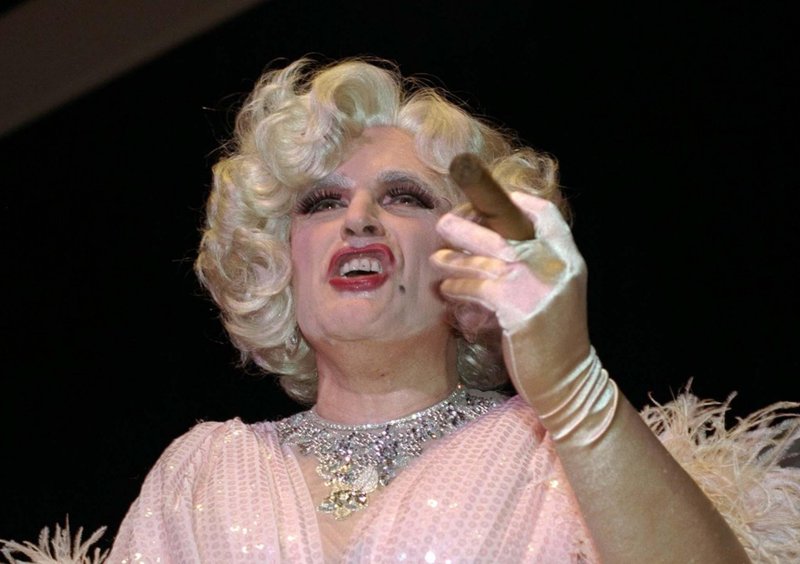
Rudy Giuliani opposes gay marriage because he “believes marriage is between a man and a woman,” as his campaign Web site states. But he supports domestic partnerships, which he believes recognize “equal rights under law for all Americans.”
What’s the difference between a “marriage” and a “partnership”? 1,100 federal rights and responsibilities, according to the Washington Post.
The next question then arises, as Marc Ambinder has put it: “What rights should straight people have that gay people shouldn’t?”
This is political dynamite, and even as Rudy declines to specify, the way he has framed the distinction implies an answer. If, as he says, he supports “equal rights,” then the only difference between “marriage” and “partnership” is semantic—a kind of “separate but equal” doctrine. Anything beyond semantics, however, logically necessitates unequal rights.
In other words, either you support equality or you support discrimination.
Rudy seems to recognize this dilemma; as a campaign spokeswoman told the Boston Globe, “It’s about rights and benefits more than the title.” Indeed, this was a point Rudy made in 2004 on the O’Reilly Factor: “So now you have a civil partnership, domestic partnership, civil union—whatever you want to call it—and that takes care of the imbalance, the discrimination, which we shouldn’t have.”
To be sure, people can reasonably disagree as to whether such sweeping change should arise democratically or juridically. But procedural issues aside, if the difference between “gay marriage” and “domestic partnership” is just words, then what’s the big deal anyway?
Addendum: Even Charles Krauthammer, who is rarely at a loss for perspicuity, can barely muster up an argument. “I think it is a mistake for society to make this ultimate declaration of indifference between gay and straight life, if only for reasons of pedagogy,” he writes.
Veteran conservative activist Craig Shirley has called it “the height of intellectual dishonesty” to advocate repealing Roe while calling for the federalization of marriage. “[B]ehavioral issues belong at the state level,” he observes.
Indeed, the conservative position on gay marriage—to say nothing of the consistent position—should be a federalist one. This is also the strategically sound liberal position, as TNR’s James Kirchick argues:
[Federalism] appeals to conservatives who oppose gay marriage (like former Georgia Congressman Bob Barr [my link]) but agree that it is a subject best left for states. It also acknowledges that the president’s power to enact legislation on gay marriage is extremely limited. The most a Democratic president could do is repeal the Defense of Marriage Act. . . . which would be a considerable accomplishment and open the door to granting federal benefits to gay couples in states where such unions are recognized. But marriage laws themselves [would] still [be] within the purview of the states.
Related: “Why Can’t Democrats Explain Their Opposition to Gay Marriage?”
Addendum (8/22/2007): The gay rights movement is often compared to the civil rights movement. But one parallel often overlooked is the importance of incrementalism.
For example, in 1957, civil rights leaders derided the Civil Rights Act as a sellout and a crippling compromise. But as (historian?) Robert Mann observed in an op-ed yesterday, “By giving lawmakers confidence that voting for once-radical ideas wouldn’t make the sky fall,” the bill “paved the way for subsequent, stronger rights legislation.”
Indeed, the monumental Civil Rights Act of 1964, like the Voting Rights Act of 1965, would never have passed in 1957.
The corollary: Same-sex equality won’t happen tomorrow. It will proceed, to borrow a phrase from political scientist Phil Klinkner, as an unsteady march.
The Politico’s Ben Smith reports from the latest Democratic debate:
Obama, like Clinton and Edwards, was unable to explain his opposition to same-sex marriage in principled terms, referring to it as a matter of “semantics.” Obama cast his opposition as a matter of strategy and priority—he would not have advised the civil rights movement to make the repeal of anti-miscegenation laws a top priority in 1961, he said.
Clinton called her opposition “personal,” but didn’t explain it. And Edwards took back an earlier comment that his “faith” had led him to oppose same-sex marriage—but didn’t elaborate on the source of his current opposition.
“Their reasons for opposing equality in civil marriage tonight became even less clear,” Human Rights Campaign President Joe Solmonese said in a statement after the debate.
It’s times like this when you gotta admire the forthrightness of Ted Kennedy, who, in reference to the Marriage Protection Amendment, thundered, “A vote for this amendment is a vote for bigotry, pure and simple.”
Rob Bluey goes into more detail here.


Scholars “use an intellectual scalpel…